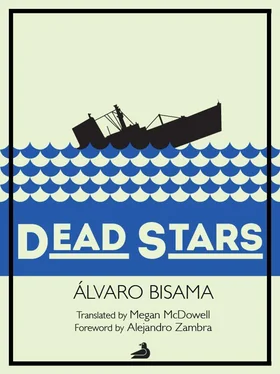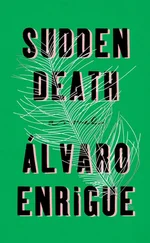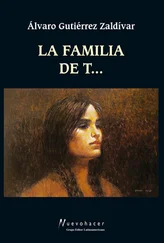It still hadn't become a story, it wasn't anything at that point, she said. Just fragments of tedium in classrooms, how cold the campus was in the mornings when the ocean wind beat against the buildings; a wind that I thought couldn't come from the sea, only from the cemetery. Sometimes it was refreshing. It was all quite logical. It was logical that Javiera would invite me to a Youth League meeting, just as it was logical that I would accept and thank her and attend. Of course, I have no memory of what was discussed at that meeting, only of what came afterward. Javiera related the other half of her life story to Donoso and me — Donoso had also gone to the meeting — in a bar a block from campus. She told us she had a son who lived in Ñuñoa, and that she had been tortured by the CNI. That's what she told us: They took me prisoner two days after they expelled me from the university. She described the days she spent in the cell; she told us that they raped her, that they applied electricity to her vagina and her breasts, that they had her on the "grill" for hours, that she got lice and crabs, that one of her torturers became obsessed with her, that it was a classmate who had snitched on her, and that the classmate was dead now; she insinuated that it was all vaguely connected to the attempt on Pinochet's life. She told us that the pain was so bad she felt like someone was yanking her guts out with their bare hands; that at the end of a week in that cell she was practically a cadaver, a mass of flesh and sores; that her hair fell out, that it turned white, that her body began to rot. She told us that she didn't talk, she didn't say a word, she didn't give anyone up. She told us they released her after a week, that they could have slit her throat, they could have opened her belly and thrown her into the sea or into a volcano in a sack weighted down with rubble. She told us that it all ended when they put her into a car, her clothes stinking of piss and blood and shit, and tossed her out in an empty lot close to an abandoned hospital in Recoleta. That she thought, in the middle of the nightmare, that she was in hell. That when she woke up, some people from the nearby shantytown picked her up. That she left the country. That abroad she got married almost immediately and had a son. That she returned in 1990.
Javiera told us all this as if it were a morality play. Javiera's life was a kind of fable: the life of a saint, a warrior, a heroine, she said. It had its happy moments — abandoned lovers in European capitals, jokes lost in translation, moments of unforgettable danger. Her life was a novel. I read it as I listened to her, but until now I never knew how it ended. Because this is the end, right now: it's what's written here in The Star . But back then I had no way of knowing, no way to guess the ending. It was getting late, so I went home. They stayed at the bar. By the next week, they were already together. Donoso told me after class one day that the courtship had been quick. That it all happened that night when I left and they stayed at the bar; that what happened later, the life that closed in around them, it all started with the beers they drank in that shadowy tavern, with the way she seduced him by telling him about her life in hiding, leaving him with no other option than the desperate gesture of brazenly displaying his youth. Almost immediately a language installed itself between them, a language that others — me, the people at the bar, fellow Party members, the rest of the city — at first saw only as a university routine, like private lessons in political education. Years later, in a hotel that was crumbling to pieces, Donoso would talk to me about those first weeks together as one of the few things that hadn't fallen apart, like the beams of a house they never managed to finish a single part of. They didn't have time, they wouldn't have time. Because Donoso told me that they'd known right away and they'd had no choice but to throw themselves into each other's arms without thinking, with no respite of any kind, no moderation.
I said: How did the Party take their relationship? They didn't like it, she said. They forgave Javiera, just like they sidestepped the fact that she was almost forty years old and still assigned to the Youth League. For a while they just let her be. There were whispers, I guess. Maybe Javiera went to the Organizing Committee and they asked her some questions. I don't know any more than that. I guess for some people it was a scandal, but she busted her ass for the Party, she'd built her life around it. They had to forgive her. She knew people in the Central Committee, in Santiago. Her husband was someone's friend or relative. Because Javiera was married, or divorced, but she never talked about that life, she acted like it didn't exist. Also, she'd been tortured. That gave her weight. It gave her moral authority. She followed in the footsteps of Gladys Marín, that type of provincial Stalinism, a port city Stalinism. Javiera could be forgiven for a slip-up, she said. Javiera had waged war and she had won the war. She'd come out of it alive. I said: I guess she didn't tell you much about their sex life. She said: Sometimes she did. I didn't want to know, but Javiera would talk. She, who lived in secrecy about almost everything, would let things slip, she'd go into detail. She liked to talk about that, about the kid she got it on with when she went home.
They took it seriously. There was no going back. It was never just a fling for them. They kept it secret for a while. At first they only told a few people close to them, but later they told their families. He moved in with her. It was Donoso who told me. I didn't know what to say. She conferred over the phone with her son, who was in grade school in Ñuñoa. She said she wouldn't be back in Santiago for a while. There were shouts and sobs on both ends of the line, and then a silence that lasted an entire day. Donoso called his mother. She was stunned, silent. His father, up north, told him that starting that very instant his monthly allowance would be cut off, because if he wanted to play grown up and have a woman, he could very well support himself on his own. Let's just see how that works out for you, he said. They tried; they survived as best they could on the meager salary the Party paid her. That detail's not irrelevant. The Party gave Javiera money, they paid her as a functionary. The Party paid her expenses. A minimum stipend, just enough to eat, to live day-to-day and work toward the revolution, she said.
So, while the revolution was incubating, they tried to live off of that salary. Donoso got an unemployment loan. They adopted a little cat that ran away across the rooftops, she said. It was a brown tomcat, really skinny. Donoso told me the cat got out of the house while he was reading Marta Harnecker. Javiera went on working for the Party. Sometimes she would go out and not come back until the next morning. Meetings. He would wait up for her, looking at things she'd hung on the walls: a photo of Neruda in hiding, crossing the cordillera on horseback; a poster of Che she'd brought from her house in Ñuñoa; a reproduction of that photo of naked Vietnamese children running toward the camera, fleeing an explosion of napalm. Donoso told me that sometimes while he waited he would masturbate furiously, to help him fall asleep, she said. Sometimes in his dreams an army of Vietnamese people in flames would chase him through the streets of Antofagasta, she said.
One day Donoso said to me: We didn't have enough to live on, so I got a job as a waiter in Viña. He went from the hills of Valparaíso to Viña by bus every day to work in one of those pasta restaurants on Calle San Martín. He worked there four nights a week. Javiera came and went from the university, and he would go to some of the meetings. The tips at the restaurant were good, she said. Donoso said that Admiral Merina came in one time and they spit in his food. After work he would meet up with Javiera in some diner and they'd drink beer, or they'd order a stout and egg if it was cold out. Then sometimes she would head off to another meeting. He was in love. When she got back from wherever she was, she would wake him up to screw. They screwed a lot; they were in heat. She told him she'd never had so much sex in her life. He had never had sex before. Donoso told me once: That's how I spent my nineteenth year — in that apartment, screwing, going to class in the morning, and praying to God that my beard would grow while I listened to the freezing wind lash against the windows.
Читать дальше





![Джеймс Чейз - Safer Dead [= Dead Ringer]](/books/430347/dzhejms-chejz-safer-dead-dead-ringer-thumb.webp)






